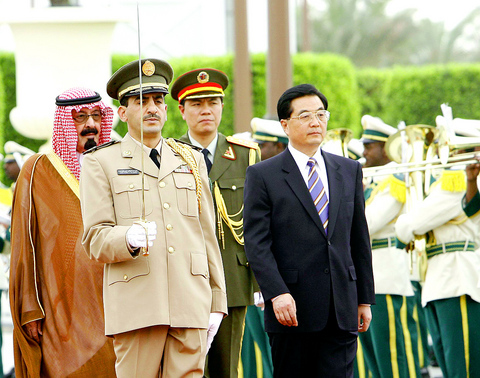Oil-rich Saudi Arabia and energy-starved China signed defense, security and trade agreements on the first day of Chinese President Hu Jintao's (胡錦濤) visit, a trip both sides expect will enhance burgeoning relations.
Hu also visited the headquarters of Saudi Basic Industries Corp (SABIC), the Middle East's largest non-oil industrial company, where he discussed a US$5.3 billion petrochemical project in China in which the Saudis are interested in investing.
Earlier on Saturday, the Chinese leader and King Abdullah oversaw the signing of security, defense, health and trade agreements, the official Saudi Press Agency reported. It did not give details on the deals.

PHOTO: AP
Hu, who arrived on Saturday from the US, told reporters at the airport he expected his trip "will further strengthen the friendship between our two countries and our two peoples as well as expand strategic and friendly cooperation between China and Saudi Arabia."
"China is satisfied with the fruitful achievements in political, economic and cultural cooperation between our two countries," he added.
Hu's trip to Saudi Arabia came three months after Abdullah's visit to China on his first overseas tour as king. It was the first by a Saudi monarch since Saudi Arabia and China established diplomatic relations in 1990.
Hu's trip comes as Saudi Arabia opens up to Asia's growing economic powers in a bid to find stable markets for its oil, step up its international diplomacy and show the West, particularly the US, that if relations worsen, the kingdom has other alternatives, analysts say.
Saudis say the pressure the US Congress recently exerted to drive away a Dubai-based company poised to operate cargo terminals at several US seaports sent a message to Arab and Muslim investors that they are not welcome in the US.
"There's a feeling among Saudis that the US Congress is deriding us, abusing us and insulting us," said Khaled al-Maeena, editor of the English-language Arab News daily.
"We need to maintain links to America, but we are not a gas station. America has to realize we want friends, not masters," Al-Maeena said.
China has been aggressively seeking to strengthen relationships with major oil suppliers as it grows more reliant on imports. Saudi Arabia accounts for about 17 percent of China's imported oil.
Total trade between the two countries -- much of it Saudi oil bought by China -- grew by 59 percent in the first 11 months of last year to US$14 billion.
At SABIC, vice chairman Mohamed al-Mady said his company would "reinforce our presence in China by establishing mega industrial projects."
"The Chinese market is a key strategic global petrochemical market from SABIC's point of view," he added.
SABIC's annual US$2 billion in exports to China include fertilizers, synthetic fabrics, iron, steel and plastic products.
Saudi newspapers, which are government guided, carried advertisements bought by Saudi companies welcoming the Chinese leader. Several said the trip would further strengthen relations between Saudi Arabia, the world's largest oil exporter, and China, the world's No. 2 oil consumer.
"For China, the kingdom is a strategic trade partner that can respond to China's need for sources of fuel that no other source can provide in terms of quantity and price," wrote Talal Bannan in the Okaz daily. "On the other hand, China, with its technology, can cater to the needs of the Saudi market by providing it with quality products at competitive prices."

PRECARIOUS RELATIONS: Commentators in Saudi Arabia accuse the UAE of growing too bold, backing forces at odds with Saudi interests in various conflicts A Saudi Arabian media campaign targeting the United Arab Emirates (UAE) has deepened the Gulf’s worst row in years, stoking fears of a damaging fall-out in the financial heart of the Middle East. Fiery accusations of rights abuses and betrayal have circulated for weeks in state-run and social media after a brief conflict in Yemen, where Saudi airstrikes quelled an offensive by UAE-backed separatists. The United Arab Emirates is “investing in chaos and supporting secessionists” from Libya to Yemen and the Horn of Africa, Saudi Arabia’s al-Ekhbariya TV charged in a report this week. Such invective has been unheard of

US President Donald Trump on Saturday warned Canada that if it concludes a trade deal with China, he would impose a 100 percent tariff on all goods coming over the border. Relations between the US and its northern neighbor have been rocky since Trump returned to the White House a year ago, with spats over trade and Canadian Prime Minister Mark Carney decrying a “rupture” in the US-led global order. During a visit to Beijing earlier this month, Carney hailed a “new strategic partnership” with China that resulted in a “preliminary, but landmark trade agreement” to reduce tariffs — but

Chinese President Xi Jinping’s (習近平) purge of his most senior general is driven by his effort to both secure “total control” of his military and root out corruption, US Ambassador to China David Perdue said told Bloomberg Television yesterday. The probe into Zhang Youxia (張又俠), Xi’s second-in-command, announced over the weekend, is a “major development,” Perdue said, citing the family connections the vice chair of China’s apex military commission has with Xi. Chinese authorities said Zhang was being investigated for suspected serious discipline and law violations, without disclosing further details. “I take him at his word that there’s a corruption effort under

China executed 11 people linked to Myanmar criminal gangs, including “key members” of telecom scam operations, state media reported yesterday, as Beijing toughens its response to the sprawling, transnational industry. Fraud compounds where scammers lure Internet users into fake romantic relationships and cryptocurrency investments have flourished across Southeast Asia, including in Myanmar. Initially largely targeting Chinese speakers, the criminal groups behind the compounds have expanded operations into multiple languages to steal from victims around the world. Those conducting the scams are sometimes willing con artists, and other times trafficked foreign nationals forced to work. In the past few years, Beijing has stepped up cooperation